by Dan Phillips
 Preface:
Preface: with all of yesterday's hilarity, I feel like some
dour, prunefaced prig coming in with this serious-subject post. But Frank has decided Thursday's my day, so if I
sit on it, he'll mock me. But then again, if I
post it, he'll mock me, so... oh well, once more into the breach.
The minefield that is prayer. I can't think of one specific doctrine, offhand, which is more tradition-laden, and buried under sentimentality, than that of
prayer.
For that very reason, it's a risky topic. Step in any direction, and you land on someone's toes. Worse, diverge from the "party line," and it's as if you're insulting Mom. Only a fool, or someone with nothing to lose, would knowingly poke a stick at that particular venerated bovine. (Say, why are you looking at me like that?)
Christianoid notions. Common Christian coinage describes prayer as a
conversation, declares that "there is
power in prayer," makes prayer out to be the be-all and end-all of Christian living. Prayer is "the greatest power on earth," we're told. Is this Scriptural thinking?
Think of Frank Peretti's
Darkness books. I read one or two. I thought them imaginative and

fast-moving, but neither great theology nor great literature.
In his imagination, Peretti pulls the curtain aside on the spiritual battle that Scripture describes. He shows demons and angels alike in action, makes up their dialogue, fantasizes their attempts to ruin or protect human beings.
Here's what sticks in my mind. What do you suppose strikes terror into Peretti's demons? When does everything start to turn around, for the demons' defeat and the saints' victory? It's when the saints
pray. Nothing scares fallen angels, apparently, like
praying Christians.
Now, it strikes me that all of this is backwards at worst, sideways at best.
Biblical teaching. What is prayer, in the Bible? It's one thing, and one thing only:
prayer is talking to God. Period. That's it. It might be talking in the form of praise, petition, confession, supplication, exclamation, or a host of other forms. It might be talking to God while happy (Psalm 43:4), sad (Psalm 42:9), mad (Psalm 10:15), hurried (Nehemiah 2:4), guilty (Psalm 51:1), busy and distracted (Nehemiah 4:9), or near death (Acts 7:59-60). But it all boils down to that one irreducible:
prayer is what you say to God.
No arguments so far? Great. Now fasten your seatbelts, and consider this:
Prayer is not a dialogue. Prayer is not a conversation. Prayer has no intrinsic power, whatever.
"What?! Heresy!"
Show me from the Bible. In the Bible, what I say to God is prayer, what He says to me is revelation, it is prophecy. If I am a Christian, I talk to Him. If He talks directly to me, unmediated, I am a prophet, or a seer. And I'm neither; nor are you.
Scripture constantly urges believers to
pray, in both covenants (Psalm 32:6; 72:15; 1 Thessalonians 5:17; 1 Timothy 2:1f., etc.).
By contrast, Scripture
never urges believers to pray and then wait for God to speak back in that prayer, expecting (demanding?) that God engage us in
conversation as a regular facet of normal Christian living. (I am using "conversation" in the strict sense: I speak, then God talks back, unmediated, verbally). Scripture never directs us to an Eastern-style emptying of the mind and listening in and to the

silence, for an imaginary "still, small,"
never-promised "voice" of God.
Prayer, if you will, is depressing the button on the walkie-talkie, and talking. No more, no less. It has been described as a soldier in the field calling for supplies and reinforcements, and that's not bad. Prayer is you, talking.
Now, if you want to hear God
speak to you,
go to His Word in faith, and He will (Proverbs 6:20-23; Hebrews 3:7ff.; 2 Peter 1:19-21, etc.).
Not only is prayer not the be-all and end-all; in fact, sometimes it is
positively wrong to pray.
What? More heresy?
Not if your Bible contains Proverbs 28:9, which reads "He who turns away his ear from listening to the law, Even his prayer is an abomination" (NAS). Such prayer is
appalling to God. It (so to speak) turns His stomach, when someone turns a deaf ear to His voice in Scripture, but expects God to hear him rattling off his "honey-do" (or "Deity-do") list of requests.
Nor is it heresy if your Bible still features the devastatingly wondrous first chapter of Isaiah, where we read in verse 15, "When you spread out your hands, I will hide my eyes from you; even though you make many prayers, I will not listen; your hands are full of blood." (Remind me sometime to tell you what I think of the National Day of Prayer. Or maybe you can guess.)
What does this mean? It means that sometimes, when someone says "I'll pray about that," the most Biblical response is, "Don't bother. You'll only make it worse." In such cases as these,
the only appropriate prayer would be a prayer of broken, heartfelt repentance and confession (Psalms 32; 51; 1 John 1:9).
Now, wonderful things can happen in response to prayer. When prayer is expressive of a relationship with God, and in accord with God's will as revealed in the Bible alone, prayer can accomplish much (James 5:16; 1 John 5:14). But of course, in these cases, the prayer itself is of no power, whatever. It is the God who hears prayer -- He is the powerful one.
Think about it. When the bully is beating you up, and all you can choke out is "Dad!", what dooms your tormentor isn't the power of your word, your "prayer" -- it's the big, angry man who loves you, hears your voice, and comes running.

So is it prayer
per se that really strikes terror into demons' hearts in this spiritual battle of ours? I do read some detail about the armor of God, crafted in Heaven to equip us for that battle (Ephesians 6:10ff.). I do read somewhere around there of prayer, and I do read of a weapon.
But the weapon isn't prayer (Ephesians 6:18). That's just us talking to God. Our words are without intrinsic power. I don't think that us talking,
per se, scares demons. In fact, I'm pretty sure that sometimes it cracks them up.
The
weapon is the
sword of the Spirit, which is the Word of God (Ephesians 6:17). God's Word sent Satan running from our Lord (Matthew 4). It will do the same for us.
Now,
there are some words with
power (Psalm 33:6, 9; Jeremiah 23:29; Hebrews 4:12)! Read, them, study them, believe them, embrace them, glory in them, live them -- and use
them in prayer.
That would result in some quaking, shaking, and glory.

 Marc Heinrich confers an extra fifteen minutes of fame on our Dan Phillips with a rollicking YSTC contest. My faves: a tie between Taliesin's "Hello. My name is Dan Phillips. You bumped my Pyro post. Prepare to die" and Daniel's (of "Duologos") "I need to apply this directly to your forehead."
Marc Heinrich confers an extra fifteen minutes of fame on our Dan Phillips with a rollicking YSTC contest. My faves: a tie between Taliesin's "Hello. My name is Dan Phillips. You bumped my Pyro post. Prepare to die" and Daniel's (of "Duologos") "I need to apply this directly to your forehead."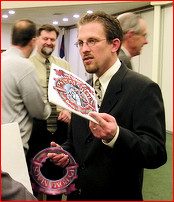 Let's just say Bob Bixby isn't very happy with us. The humor, comments, and graphics here (especially "the ubiquitous Pyromaniacs label") are not his mug of tea. He absolutely hates Frank Turk's PyroGear ("puhleeze!") and Dan's graphic signature ("good grief!"). He compares us to "the bowling team from the local pub," likens our comments to a "gladiatorial flogging," and associates our blogging style with "chest-beating and snorting." He cannot find a way to reconcile our "joviality and boyishness" with "serious doctrine"; and he finds it next to impossible to "parse between the slapstick and the serious." As far as Bob is concerned, fun and fundamentalism are "as difficult to assimilate as the Macarena dance at a car wreck."
Let's just say Bob Bixby isn't very happy with us. The humor, comments, and graphics here (especially "the ubiquitous Pyromaniacs label") are not his mug of tea. He absolutely hates Frank Turk's PyroGear ("puhleeze!") and Dan's graphic signature ("good grief!"). He compares us to "the bowling team from the local pub," likens our comments to a "gladiatorial flogging," and associates our blogging style with "chest-beating and snorting." He cannot find a way to reconcile our "joviality and boyishness" with "serious doctrine"; and he finds it next to impossible to "parse between the slapstick and the serious." As far as Bob is concerned, fun and fundamentalism are "as difficult to assimilate as the Macarena dance at a car wreck."

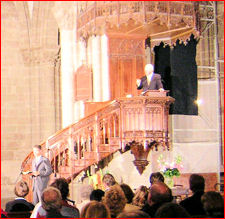
 f you're a subscriber to
f you're a subscriber to  That glorious man, Calvin! I preached in the cathedral. I do not think half the people understood me in the Cathedral of St. Peter's; but they were very glad to see and join in heart with the worship in which they could not join with understanding.
That glorious man, Calvin! I preached in the cathedral. I do not think half the people understood me in the Cathedral of St. Peter's; but they were very glad to see and join in heart with the worship in which they could not join with understanding.
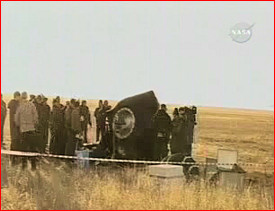




 y friend Col. Jeff Williams will soon be on his way home from the International Space Station (ISS).
y friend Col. Jeff Williams will soon be on his way home from the International Space Station (ISS). ncidentally, last week I posted this digital photo snapped by Jeff:
ncidentally, last week I posted this digital photo snapped by Jeff: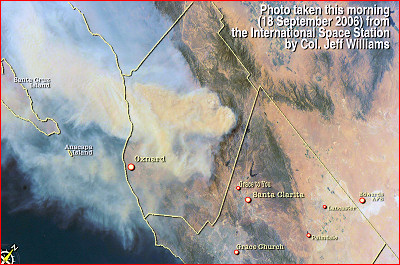
 me, and purred nicely. But I still didn't get to sleep until 11-ish -- which just doesn't work when you have to get up around 4, and have had a fun but very active weekend.
me, and purred nicely. But I still didn't get to sleep until 11-ish -- which just doesn't work when you have to get up around 4, and have had a fun but very active weekend.

 Tuesday went by and Phillips didn't post?
Tuesday went by and Phillips didn't post?
 was converted to biblical Christianity during my final semester in high school. I had grown up in an extremely liberal United Methodist Church, where I had no exposure whatsoever to evangelicalism. Frankly, I don't remember ever hearing anything about the gospel in all those years in the Methodist church.
was converted to biblical Christianity during my final semester in high school. I had grown up in an extremely liberal United Methodist Church, where I had no exposure whatsoever to evangelicalism. Frankly, I don't remember ever hearing anything about the gospel in all those years in the Methodist church. I always assumed "salvation" was a Baptist idea, irrelevant to a born-and-bred Methodist like me.
I always assumed "salvation" was a Baptist idea, irrelevant to a born-and-bred Methodist like me.
 his weekend GraceLife sponsored a family conference. Between Saturday and Sunday, I spoke a total of five times (plus a Q&A session), and that's why there was no BlogSpotting post Saturday. Here is an abbreviated make-up post. These are by no means all the links we could cite from this week, but it's as much as I can do at the end of a loooooooong weekend:
his weekend GraceLife sponsored a family conference. Between Saturday and Sunday, I spoke a total of five times (plus a Q&A session), and that's why there was no BlogSpotting post Saturday. Here is an abbreviated make-up post. These are by no means all the links we could cite from this week, but it's as much as I can do at the end of a loooooooong weekend:
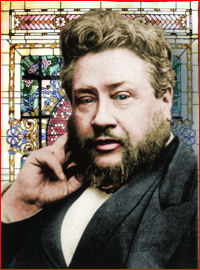 hat marvel if, under some men's shifty talk, people grow into love of both truth and falsehood! People will say, "We like this form of doctrine, and we like the other also." The fact is, they would like anything if only a clever deceiver would put it plausibly before them. They admire Moses and Aaron, but they would not say a word against Jannes and Jambres. We shall not join in the confederacy which seems to aim at such a comprehension.
hat marvel if, under some men's shifty talk, people grow into love of both truth and falsehood! People will say, "We like this form of doctrine, and we like the other also." The fact is, they would like anything if only a clever deceiver would put it plausibly before them. They admire Moses and Aaron, but they would not say a word against Jannes and Jambres. We shall not join in the confederacy which seems to aim at such a comprehension.
 even a pretence of engaging Scripture. Okey doke?
even a pretence of engaging Scripture. Okey doke?




 fast-moving, but neither great theology nor great literature.
fast-moving, but neither great theology nor great literature. silence, for an imaginary "still, small," never-promised "voice" of God.
silence, for an imaginary "still, small," never-promised "voice" of God.




























